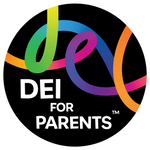
Despite the current weaponization of the DEI acronym, instilling diversity and equality values into the minds of the next generation remains a parenting imperative.
Beneath the heated DEI rhetoric lies an essential truth: the morals embodied by DEI—human decency, empathy, and fairness—are fundamentally rooted in our homes.
Teach DEI at Home: What DEI is NOT
One common criticism of DEI is that it encourages polarizing identity politics. Critics argue that concentrating on differences rather than similarities fosters resentment.
Although strict commitment to identity politics can be counter-productive, DEI does NOT advocate for group persecution.
Rather, the focus is on identifying and resolving structural injustices that have historically disadvantaged specific groups of people.
Another argument contends that DEI initiatives amount to brainwashing. Some parents fear that their kids are being indoctrinated to feel guilty about their privilege or to take responsibility for the deeds of their ancestors. This is a major misunderstanding of DEI.
The goal is not to shame children, BUT RATHER to promote empathy and understanding. The bottom line is that children can get a more complex view of the world and their role in it by learning about other people's experiences.
In spite of these attacks, it's so important to remember that DEI is more than just a political agenda or a corporate buzzword. It's a mirror of our common humanity.
We live in an increasingly diverse world, and our children will undoubtedly come into contact with people from a variety of origins and cultures. The goal is to raise informed, sensitive, and empathic children.
Teach DEI at Home: How Parents Can Help
Historically, DEI projects focused mainly on addressing inequities in employment, education, and healthcare. But recently, social justice movements have accelerated a more thorough understanding of inequality and its effects at every level of society.
As our society becomes more diverse, it's becoming increasingly clear that the most logical place to instill values that align with modern demographics is at home.
Parents now have a golden opportunity to lay the groundwork for a more compassionate society by shaping an inclusive mindset at home.
The Future of DEI
While resistance to DEI policies is currently widespread, there's lingering hope that we can raise a generation of compassionate, respectful humans who see the humanity in EVERYONE.
And while no one can predict the future, a careful review of past social-justice movement timelines clearly shows that universal adoption of DEI principles is (eventually) inevitable.
Whatever you want to call it - DEI or diversity or inclusion or equal rights or whatever - the core principle is the same: people are people.
And the best place to learn that is at home.
